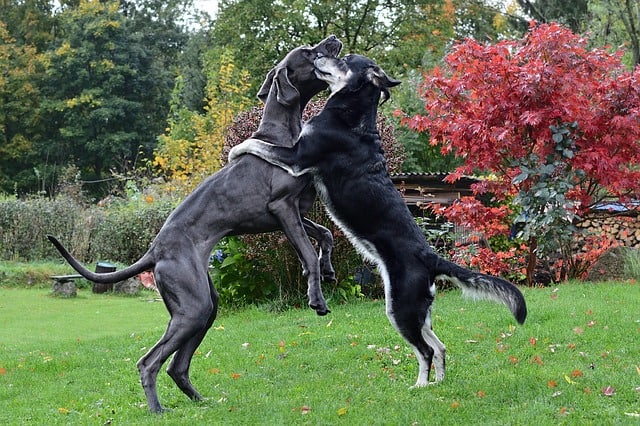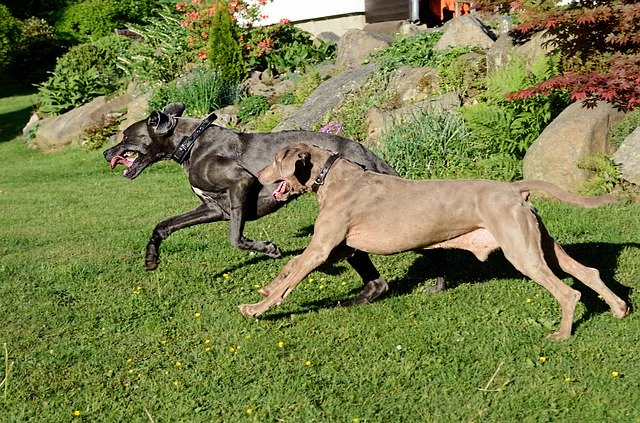
Varying dog breeds require different levels of attention, caring and training. If you’re fascinated with large breed dogs like Great Danes and Irish Wolfhounds, welcome to the clan. But living with them isn’t easy. It has its own pros and cons. Apart from taking up larger spaces on the floor and the bed, there are several other aspects that require greater attention in raising large breed dogs. If you’re still up for it, here’s everything that you need to know about them in order to decide.
Nutrition
Large breed dogs grow extremely fast and their food consumption can rip your pockets. So unless you’re ready to pay for their food and nutrition expenses, you should think twice before getting one. A basic rule that applies to all dogs is that you shouldn’t leave food in their bowls, because they tend to overeat, which might make them overweight. The same rule applies to large breeds. Eating more can make them fat, and so you should stick to feeding them the recommended portion size. Do not feed them more than three times a day until they are six months old. While buying dog food, you must’ve noticed that it’s high in protein and calories. To decide the best food type and nutrition for your large breed dog, you should consult your vet after he turns 12 months old.
Grooming
Applicable to all dogs, bathing and grooming are necessary to maintain hygiene and to prevent diseases. Bathing your large breed dog will be extremely difficult due to his enormous body and strength. You need to start training him since his younger days, in order to stay put in the tub. Depending on your dog breed, you’ll also need specific products according to his coat, hair type, and length of fur. Numerous insightful reviews by Canine Weekly suggest the best grooming equipment for your large breed dogs such as flea shampoos and several other grooming tips. These are essential information as some breeds require a specific type of care. Apart from bathing, brushing his teeth, clipping his nails, and brushing his coat regularly is important.
Exercise and Training
Large breed dogs face more obesity and weight gain issues and thus it’s important for them to exercise regularly. Large breed puppies look bigger than they are, and thus you shouldn’t force them into training, as it can put extra pressure on their muscles and joints. You should consult your vet to understand the amount of exercise and duration of walks that your large breed puppy would need every day. If you feel that your puppy is showing too much energy, you can use it to train him instead of taking him for long runs. Big dogs show fierceness and are extremely strong, and so it’s important to train them. Training and obeying commands can prevent them from jumping on people and chasing other dogs. It’ll keep them more composed and quiet for the size they are. You can inculcate basic commands such as sit, stay, lie down, leave it and come to begin with, from his early days. It’s really easy to stay with a trained dog, especially if you have a big one.
Tools and Gear
Apart from the basic grooming products like shampoos, toothbrushes, nail clippers and fur brush (that are the basic necessities for any dog), large breed dogs would exclusively require specifically designed beds that are large enough to accommodate them. You’d also need a stronger leash, neck collar, and a harness. Other requirements are big food and water bowls for comfortable eating and drinking. You should also consider buying bigger and stronger toys for your large dog to prevent him from tearing them with his tough jaw.
Health Issues
As mentioned, large breed dogs can face weight issues if fed more. They can also develop muscle and joint pain if over-exercised. As soon as you notice that your dog’s pace has slowed down, or he’s more lethargic than usual, it can be a sign of a health issue. Your vet can suggest the best products for his health and fitness, like certain probiotics or medication.
Socializing
Even though training can help your dog to behave, socializing can make him more adept at being around people. You should start introducing your dog when he’s still a pup, which will normalize it until he’s grown up. Taking him out for walks or letting your guests play with him can make him friendlier and less aggressive.

Even though we said in the beginning that adopting large breed dogs can be difficult, a few appropriate products and some careful consideration can ease the process. If your budget allows you, just go for it! A dog is, after all, every man’s best friend.
